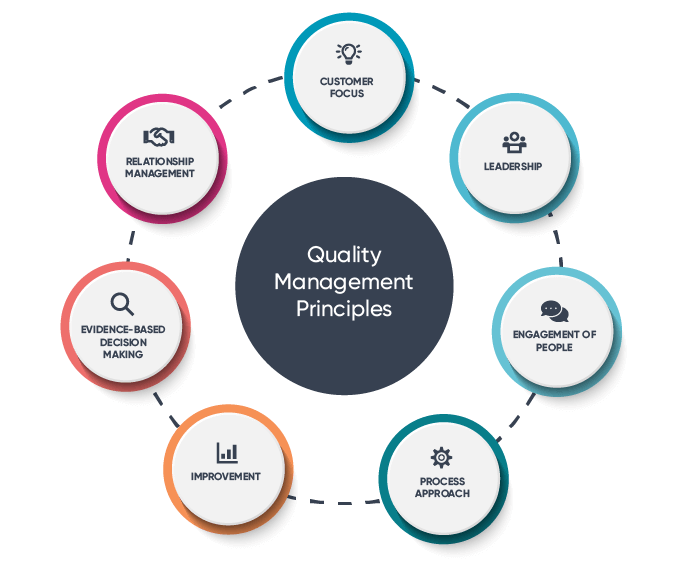Quality management principles: still relevant for 2021?
Quality management principles: superfluous business-speak or enduring pillars of wisdom? Here we take a fresh look at the ISO 9001 principles, aka the ‘7 principles of quality management’, debunk some myths and learn why they are still invaluable today.
ISO 9001 principles
The ISO 9001, introduced in 1994, is a fancy term for the quality management standards that a business must meet in order to become ISO 9001 certified.
“Think of them as a formula that describes the best way of doing something.”- ISO
The 7 principles of quality management
Are there 7 or 8 quality management principles? Although many people still refer to the '8 principles of quality management', note that the most recent version of the ISO standard (9001: 2015) lists only 7.
Indeed, principle 5 ‘Systematic approach to management’, was removed in the 2015 model, which was adapted from the 2008 version for new regulatory requirements and emphasises the importance of a process approach. This newer version also states that leaders should promote a culture of quality throughout their organisation.

QMP 1 – Customer focus
QMP 2 – Leadership
QMP 3 – Engagement of people
QMP 4 – Process approach
QMP 5 – Improvement
QMP 6 – Evidence-based decision making
QMP 7 – Relationship management
The ISO vision:
ISO is an independent, non-governmental international organisation that was initially formed in Geneva in 1947. Its raison d’être is to bring together experts to develop consensus-based, market relevant International Standards that support innovation and provide solutions to global challenges. It is now recognised as a sturdy and reliable cornerstone that unites businesses across the world around common values and best practice methods.
In a post-Covid landscape, ISO’s focus on global solutions to tackle global challenges is arguably more resonant than ever before. In the past year we have seen experts joining together across geographical borders, and business sectors, to distil their collective wisdom and weather the storm of the pandemic. Yet despite its golden reputation, ISO has nevertheless received backlash from some who struggle to see its benefits or relevance.
Is ISO 9001 worth my time and money?
In 2000, John Seddon wrote The Case Against ISO 9000, in which he argues that managers point to the excessive bureaucracy and work whose only purpose is to satisfy the ISO 9000 assessor. (Note that ISO 9000 is a family of standards that describe a Quality Management System. ISO 9001 is the document that contains the requirements.) He also suggests that the standard has spawned the growth of certification bodies that profit from companies’ fears that if they don’t comply, customers won’t buy.
In spite of Seddon’s criticisms, ISO standards are still widely recognised and trusted more than two decades later and continue to form the foundations of successful organisations across the world. Basically, if you have an ISO certification, you’re aligning yourself with ISO’s long-standing heritage and ethos. It informs customers that you are dedicated to excellence and consistency.
Moreover, in ‘ISO 9001: Debunking the Myths’ (2015), ISO argues that paperwork is relatively limited. Today, with the power of artificial intelligence, contemporary QMS systems have taken much of the bureaucracy out of the process, which enables companies to focus on what matters.
Principles of quality management
Let’s take a closer look at the 7 quality management principles, as defined by ISO:
Principle 1: Customer focus
This principle is all about making the customer your top priority: if they’re happy, this can lead to repeat custom and a flourishing business. We all like to get recommendations from people we trust. If you consistently meet and exceed your customers’ expectations, watch your business grow via word of mouth as new clients are drawn in by your glowing reputation.
Principle 2: Leadership
We’re not only talking about the CEO: ISO refers to leaders at every level of the business. Excellent leaders create an environment in which people feel a sense of purpose and are motivated to achieve the company’s unified goal and quality objectives.
Principle 3: People involvement
ISO believes that people at all levels of an organisation should be respected as individuals and encouraged to be competent, empowered and engaged. This is because people involvement is essential for enhancing a company’s capacity to create and deliver value.
Principle 4: Process approach
Just as the human body is composed of multiple interrelated systems (e.g., the nervous system, the digestive system, the endocrine system etc.), a successful organisation functions in a similar way.
ISO argues that consistent and predictable results are achieved when activities are managed as interrelated processes that function as one system. This process approach to management facilitates a better understanding of the ways in which an organisation can optimise its performance at every level.
Principle 5: Continual improvement
Can you a remember a brand name that used to be everywhere, but which ultimately faded from view? Unfortunately, some companies let success get to their heads—complacence leads them to rest on their laurels. A focus on continual improvement is essential for maintaining performance, reacting to changes (both internal and external) and creating opportunities.
Principle 6: Evidence-based decision making
This principle is about data-driven decision making. ISO states that it’s best to analyse facts, evidence and data in order to have greater objectivity and confidence when making an important decision.
Principle 7: Relationship Management
This principle is about managing and promoting positive relationships with interested parties and stakeholders, such as suppliers. This is because such parties influence the success and performance of an organisation.
Does ISO provide certificates for ISO 9001?
ISO 9001 certifications are carried out by third-party organisations. To get certified, you have to implement a quality management system according to the most recent ISO 9001 standard and have it audited by a certified auditor.
Nicola spends her days thinking about how teams work better together —and how we can make document collaboration a little less painful with technology. She's particularly interested in helping teams within highly regulated industries, where data security and compliance are paramount, to streamline their processes and boost efficiency.


